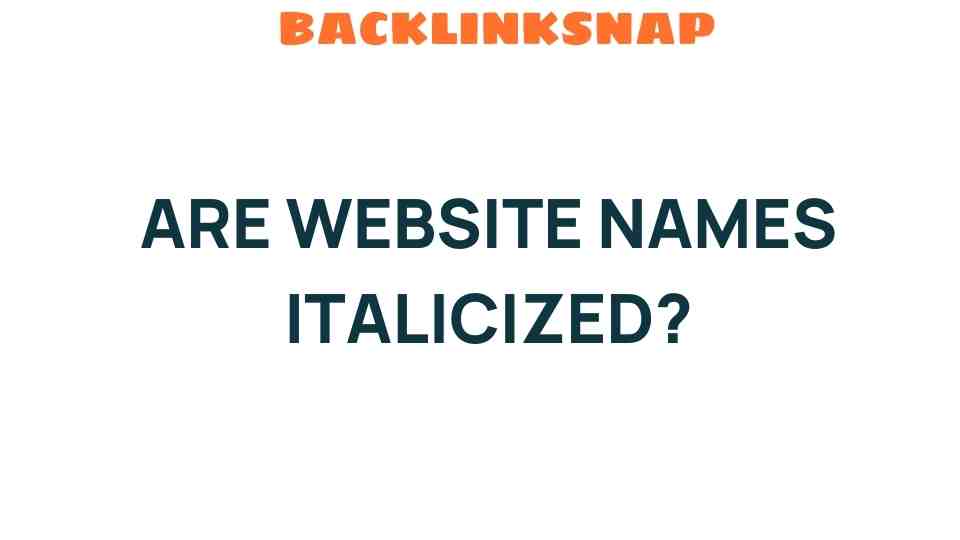Are Website Names Italicized? Unraveling the Mystery of Online Formatting
In the vast expanse of digital content, where clarity and precision are paramount, one question often arises: are website names italicized? This seemingly simple query opens up a broader discussion on website names, formatting styles, and grammar rules that govern the realm of online writing. Understanding how to properly format website names not only enhances readability but also aligns with good SEO practices and professional web design.
The Importance of Formatting in Digital Content
Formatting isn’t just about aesthetics; it serves a purpose in conveying meaning and maintaining consistency. When it comes to online writing, various elements such as headings, lists, and emphasis through bold or italicization can significantly impact the user’s reading experience. Proper formatting can guide readers through the content, helping them discern important information quickly.
Website Names and Their Formatting
Now, let’s get to the heart of the matter. The formatting of website names is influenced by the style guide being followed. For instance, the Chicago Manual of Style recommends italicizing the names of websites, while the Associated Press (AP) style prefers them to be in plain text without italics. This divergence often leaves writers and content creators scratching their heads.
Here are some common practices regarding the formatting of website names:
- Italicization: Generally accepted in academic and formal writing contexts.
- Plain Text: Preferred in journalistic writing and some online platforms.
- Quotation Marks: Sometimes used, particularly for articles or pages within a website.
Understanding Different Formatting Styles
When creating digital content, it’s essential to understand the context in which you are writing. Let’s delve deeper into the most prominent style guides and their recommendations for formatting website names:
1. APA Style
The American Psychological Association (APA) style suggests that website names should be italicized. For example, you would write it as www.examplewebsite.com. This guideline helps to distinguish the website from the surrounding text and provides a clean look that enhances readability.
2. MLA Style
The Modern Language Association (MLA) also recommends italicizing website names. This is especially useful in academic writing, where clarity and attention to detail are crucial. For instance, you would write: “The research was published on www.researchsite.com.”
3. Chicago Style
Chicago style is similar to MLA in that it advocates for italicization of website names. It’s important for writers to be consistent with whichever style they choose to follow throughout their document.
4. AP Style
Conversely, the Associated Press style guide advises against italicization. Website names should be presented in plain text. For example, you would simply write: “Visit www.examplewebsite.com for more information.” This approach is designed for ease and speed in journalism, where quick reading is vital.
Implications for SEO Practices
Understanding how to format website names is also crucial for SEO practices. While search engines like Google do not prioritize italicization in their algorithms, user experience does play a role in SEO. Well-formatted content that is easy to read can decrease bounce rates and improve engagement metrics, which are valuable for search rankings.
Here are some tips for balancing formatting with SEO:
- Consistency is Key: Stick to one format throughout your content to maintain professionalism.
- Use Links Wisely: Instead of just naming the website, hyperlinking to the site can provide direct access and improve the user experience.
- Focus on Readability: Ensure that your formatting choices enhance, rather than detract from, the overall readability of your content.
Practical Examples in Action
Let’s look at some practical examples that illustrate these guidelines in a real-world context:
When referencing a website in a blog post about digital marketing, you might write:
“For effective strategies, visit www.digitalmarketingworld.com to explore various resources.”
In contrast, if you were writing an article for an online news outlet, you might say:
“Find more details at www.digitalmarketingworld.com.”
Common Questions About Website Name Formatting
1. Should I italicize website names in academic papers?
Yes, most academic style guides recommend italicizing website names to distinguish them from the rest of the text.
2. Is it necessary to include “http://” or “www.” when mentioning a website?
While it’s not necessary in all contexts, including “http://” or “www.” can provide clarity, particularly for readers unfamiliar with the site.
3. Are there exceptions to italicizing website names?
Yes, some style guides like AP do not require italicization, so it’s essential to know the guidelines relevant to your writing context.
4. Can I use quotation marks for website names?
Yes, quotation marks can be used, especially for articles or specific pages within a website, but they aren’t the standard practice for overall site names.
5. What if I’m unsure which style to follow?
When in doubt, choose a style guide that aligns with your audience or publication standards, and be consistent throughout your work.
6. Does formatting affect SEO?
While formatting itself doesn’t directly impact SEO, good formatting improves user experience, which can indirectly influence search rankings.
Conclusion
In summary, the question of whether to italicize website names hinges on the style guide you’re following and the context of your writing. Whether you choose to italicize, use plain text, or employ quotation marks, consistency is vital. Proper formatting not only enhances the readability of your content but also aligns with best practices in web design and SEO practices. As you navigate the world of digital content, remember that clarity, precision, and adherence to established grammar rules can significantly elevate your writing.
For more insights on effective online writing, you can explore this guide.
And for further details on style guides, check out this resource.
This article is in the category SEO Optimization and created by BacklinkSnap Team




